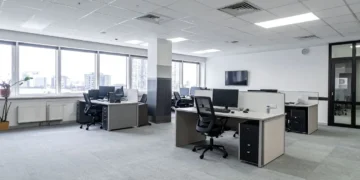- In view of wide-spread doubts of the sustainability of office work it may seem an odd time for IWG plc to make a major bond issue to finance expansion.
- But IWG has done just that, launching a £350 million (US$455 million) convertible bond issue, demonstrating confidence in the long term demand for flexible space.
- Its expansion plan includes acquisitions in multiple locations including the UK and “other potential deals in Europe, Asia and the US.”
By Jonathan Price, CEO of B3C and an investment management consultant for the flexible workspace industry.
Since the arrival of the Coronavirus Covid-19 in February 2020, many people have been wondering about the future of the office.
Bruce Daisley, author of The Joy of Work, has no doubts: “Unfortunately, we might get misty-eyed about it but I think the office in the form it used to be is probably now a thing of the past,” he told BBC Radio 4’s Today programme, the leading current affairs programme in the UK media.
Even the serious writers for The Economist noted in the September 12th edition that, “working from home seems to have suited many white-collar employees.”
In view of wide-spread doubts of the sustainability of office work it may seem an odd time for an office space business to make a major bond issue to finance expansion, but IWG plc, formerly known as Regus, has done just that, launching a £350 million (US$455 million) convertible bond issue.
The seven year bonds will carry a coupon of 0.5% p.a. payable semi-annually and are convertible into the ordinary shares (common stock) of IWG at a premium of 40% to the volume weighted average price of the shares.
Long term structural change accelerated by Covid-19
Why would IWG wish to do that, and why would investors want to buy the bonds?
The answer is that the CEO of IWG, Mark Dixon, believes that the office market is in long term structural change from fixed, long term commitments to flexible shorter term ones, and the arrival of Covid-19 will simply serve to accelerate that change.
“In my opinion, this is the perfect growth strategy for IWG at this time,” said Frank Cottle, Chairman and CEO of the Alliance group of companies. “They have succeeded in the past coming out of challenging markets, and I have no doubt they will succeed this time as well.”
It is possible that the overall amount of office space occupied by corporations will decline as more people work from home, but the proportion of office space that is flexible, serviced space will rise from the current levels of 5% or less to something nearer the 20%-25% that academics say is optimum.
So, IWG is confident in the long term demand for flexible space, and it sees an opportunity to increase its market by acquisition at a time when falling occupancy and revenues may make some owners more motivated to consider offers favourably.
According to Redmayne Bentley, a London stockbroker, these acquisitions, “include a UK acquisition, a bolt-on US purchase in the final stages of due diligence and other potential deals in Europe, Asia and the US.”
Acquisition “war chest”
Certainly IWG will have a huge war chest to pay for acquisitions.
According to its regulatory filing for the bond issue, taking into account the gross proceeds of the transaction, IWG’s pro forma liquidity headroom as at 30 September 2020 would be £1,163.2 million (US$1.51 billion) before the deployment of funds.
There is little that it could not buy in the serviced office sector for that sort of money.
Why then are investors so confident? It would be too much to say that they all share IWG’s belief that the office sector is sustainable in the long term, but they have confidence in Mark Dixon’s ability to judge the market and are encouraged that IWG’s largest investor, Toscafund, has subscribed for £6.3 million of the bonds, having earlier in the year also subscribed to an equity placing by IWG.
They also recognise, no doubt, that this bond issue represents very cheap money for IWG, given the low coupon and high conversion premium.
Whatever the reasons, the joint book-runners HSBC and Barclays managed to get the bond away at the top of the size range and the bottom of the indicated coupon range, demonstrating good demand for the bonds.
We can only wait with interest to see where IWG decides to do its Christmas shopping.
Jonathan Price, CEO of B3C, is a pioneer in the field of flexible office investment. He was a co-founder of the world’s first public fund for the flexible workspace industry, and shares over 25 years of financial expertise and knowledge as a consultant and a lecturer at the London School of Business & Finance. Jonathan can be reached at [email protected].



 Dr. Gleb Tsipursky – The Office Whisperer
Dr. Gleb Tsipursky – The Office Whisperer Nirit Cohen – WorkFutures
Nirit Cohen – WorkFutures Angela Howard – Culture Expert
Angela Howard – Culture Expert Drew Jones – Design & Innovation
Drew Jones – Design & Innovation Jonathan Price – CRE & Flex Expert
Jonathan Price – CRE & Flex Expert












